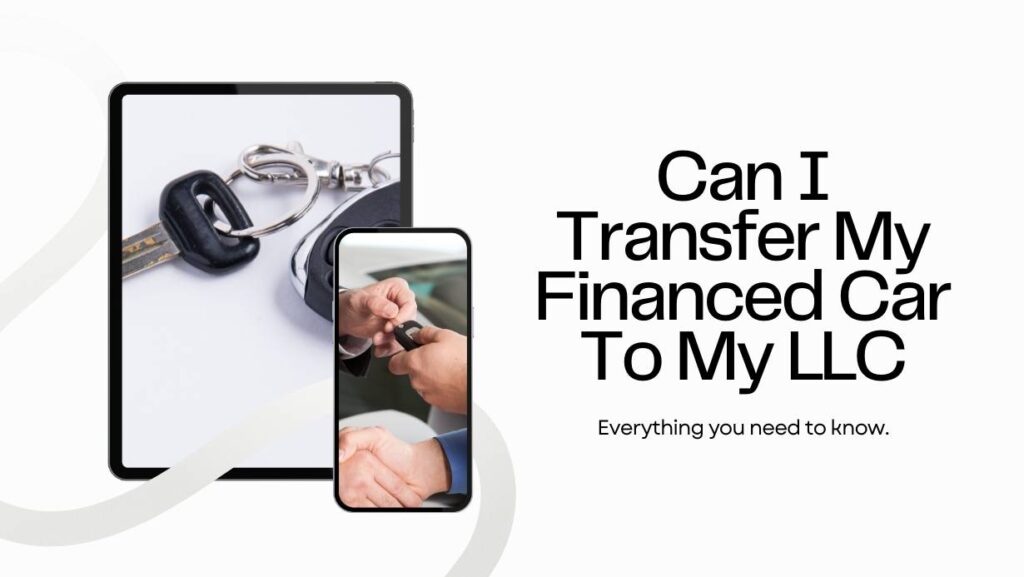Transferring a financed car to your LLC might be tricky. Check with your lender first, as some restrict ownership changes. You’ll likely need to refinance under the LLC. Consider tax implications, too.
Introduction
Transferring a financed car into an LLC (Limited Liability Company) can be a strategic move for business owners looking to maximize tax advantages, enhance asset protection, and streamline business operations. However, navigating the process involves understanding the legal, tax, and financial implications. It requires careful consideration of the loan terms, the lender’s policies on transferring assets, and the potential tax consequences of moving a personal asset into a business entity. This introductory exploration aims to guide individuals through the preliminary steps and considerations necessary to transfer a financed car into an LLC, highlighting the potential benefits and challenges.
The Basics of Transferring Finance Car Ownership
Transferring the ownership of a financed vehicle requires careful navigation through financial and legal protocols. This process begins with obtaining consent from your lender, as the car is essentially collateral for the loan. Additionally, reviewing your loan agreement for any clauses that may restrict ownership transfer is crucial. Once lender approval is secured, the following steps involve completing a transfer of title, which varies by state, and ensuring all related taxes and fees are paid. This task also necessitates notifying your insurance company to adjust the policy accordingly. Successfully transferring a financed car’s ownership hinges on meticulous attention to these procedural details.
Explaining the concept of transferring ownership from an individual to a business entity
Transferring ownership of a financed car to an LLC, known as “title transfer,” involves moving the vehicle from personal possession into a business entity. This strategic move can offer tax benefits and liability protection. However, it requires lender approval, adherence to state laws, and careful financial planning to ensure compliance and maximize the advantages of asset reallocation within your business structure.
Definition and significance of an LLC
An LLC, is a flexible business structure that offers its owners, known as members, protection from personal liability while allowing profits to pass directly to them, bypassing corporate taxation. This amalgamated structure merges the liability safeguarding of a corporation with the tax advantages and operational adaptability of a partnership, rendering it an appealing choice for entrepreneurs.
Understanding financed vehicles and their ownership structure
When discussing financed vehicles, it’s essential to recognize that ownership is shared between the individual (or entity) and the lender until the loan is fully repaid. This dual ownership structure complicates transferring the vehicle to an LLC, as both the lender’s terms and state laws play significant roles.
Importance of legal compliance in ownership transfer
The importance of legal compliance in transferring vehicle ownership must be balanced. Critical steps include:
- Adhering to state regulations.
- Satisfying lender requirements.
- Ensuring the transfer aligns with the LLC’s operating agreement.
Each component ensures the transfer is legally sound, protecting the business and its members from potential legal and financial repercussions.
Benefits of Transferring a Financed Car to an LLC
Transferring a financed car to an LLC can offer several compelling benefits, making it an attractive consideration for business owners. Primarily, it allows for potential tax deductions related to the vehicle’s use for business purposes, including depreciation, maintenance, and fuel costs. Additionally, placing the car under an LLC provides liability protection, as the vehicle is considered an asset of the business, separating personal assets from business liabilities. This strategic move can enhance financial efficiency and operational flexibility. However, navigating this process with due diligence is crucial to ensure compliance with legal and financial regulations.
Asset Protection and Liability Shielding
Transferring a financed car to an LLC offers critical advantages, including asset protection and liability shielding. This strategic move safeguards personal assets by distinguishing them from business liabilities. In a legal dispute or financial distress, the LLC acts as a barrier, preventing personal assets from being targeted. This separation ensures a layer of security, offering peace of mind to business owners navigating the complexities of asset management.
Shielding personal assets from business liabilities
Shielding personal assets from business liabilities is a strategic benefit of transferring a financed car to an LLC. This approach establishes a clear boundary between an individual’s personal wealth and the financial obligations of their business. It ensures that personal assets, such as homes and savings, are protected from legal actions or debt recovery efforts aimed at the business. By utilizing an LLC as a legal entity for asset ownership, individuals effectively safeguard their personal holdings against the unpredictability of business risks.
Mitigating the potential for personal financial detriment in the event of lawsuits or business indebtedness.
Minimizing the potential for personal financial damage due to legal actions or business obligations is a vital aspect for entrepreneurs to consider.Transferring a financed car into an LLC plays a significant role in this risk management strategy. It limits the individual’s exposure to financial liabilities arising from legal disputes or debt obligations tied to the business. This organizational structure is designed to absorb such shocks, preventing personal finances from being compromised. As a result, owners can navigate the business landscape with increased confidence, knowing their financial security is better insulated against business-related economic challenges.
Tax Advantages and Business Expenses
Transferring a financed car to an LLC unlocks tax advantages and optimizes business expenses. This strategic move enables business owners to deduct vehicle-related costs, such as maintenance, fuel, and depreciation, directly from their income, effectively lowering their taxable income. Classifying the car as a business asset facilitates a clearer financial delineation between personal and business expenses, leading to more efficient tax planning and potentially significant savings.
Leveraging tax deductions for business use of the vehicle
Leveraging tax deductions for the business use of a vehicle becomes significantly streamlined when a financed car is transferred to an LLC. This strategic shift allows business owners to meticulously account for and deduct operational costs such as fuel, maintenance, and insurance from their taxable business income. It effectively transforms necessary expenditures into fiscal advantages, optimizing the business’s financial health.
Potential tax savings through depreciation and expense deductions
Furthermore, transferring a financed car to an LLC opens the door to potential tax savings through depreciation and expense deductions. The vehicle’s depreciation becomes a calculable business expense, reducing the taxable income. This maximizes financial efficiency and encourages innovative asset management, providing a pathway to more sustainable business operations and profitability.
Enhancing Professionalism and Brand Image
Transferring a financed car to an LLC streamlines financial management and significantly enhances a business’s professionalism and brand image. This strategic move signals to clients, partners, and competitors that the company is committed to maintaining a formal and severe approach to its operations. Vehicles registered under a business entity can be branded with the company’s logo, further solidifying its presence in the market and reinforcing its brand identity.
Projecting a professional image by registering business assets in the name of the LLC
Projecting a professional image is crucial in today’s competitive business landscape, and registering business assets, like a financed car, under the LLC is a strategic step towards this goal. This action underscores a commitment to formal business practices, enhancing the entity’s credibility and professionalism. It visibly distinguishes the business as organized and serious about its operations, which can positively impact perceptions among clients and competitors alike.
Building credibility with customers, partners, and stakeholders
Moreover, building credibility with customers, partners, and stakeholders is significantly bolstered when a business’s assets align with its legal and professional identity. By transferring a financed car to an LLC, businesses demonstrate responsibility and reliability, fostering trust and strengthening relationships with all stakeholders. This strategic alignment can be a cornerstone in establishing and maintaining a robust and reputable brand.
Assessing Eligibility and Feasibility
Assessing eligibility and feasibility is a critical initial step for business owners considering transferring a financed car to their LLC. This process involves thoroughly reviewing the loan agreement to ensure that transferring ownership does not violate any terms and to understand lender requirements for such a transfer. Additionally, it’s essential to evaluate the financial implications, including tax consequences and potential benefits, to ensure that the move aligns with the business’s strategic goals. Seeking advice from legal and financial professionals can offer critical understanding of the intricacies involved in the transaction, assisting in making a well-informed choice that favors the firm’s enduring prosperity.
Criteria for Transferring Ownership to an LLC
The criteria for transferring ownership of a financed car to an LLC involve a detailed evaluation of both legal and financial prerequisites. Key considerations include:
- Ensuring the vehicle’s use aligns with business activities.
- Obtaining consent from the lender.
- Adhering to state-specific registration processes.
This meticulous approach ensures the transfer complies with all regulatory and contractual obligations, legitimizing the asset under the business entity.
Financial Considerations and Credit Impact
Moreover, financial considerations and the impact on credit are pivotal in this decision-making process. Transferring a financed vehicle to an LLC may influence the business’s credit profile and financial health. Assessing how this transfer affects loan obligations, potential tax benefits, and overall financial strategy is essential. Business owners must consider the implications on personal and business credit scores, ensuring the move fosters economic stability and growth for the LLC.
Step-by-Step Guide to Transfer a Financed Car to an LLC
Transferring a financed car to an LLC involves a few crucial steps. Initially, consult with your lender to gain approval for the transfer, as adhering to the loan agreement is vital. Next, review your LLC’s operating agreement and state regulations to ensure compliance. Then, prepare and file the necessary documentation for the title transfer with your state’s DMV, including any required fees. Finally, update your insurance policy to reflect the new ownership under the LLC. This streamlined approach ensures a smooth transition while safeguarding legal and financial integrity.
Notifying the Financing Company
Notifying the financing company is pivotal when transferring a financed car to an LLC. This initial communication is crucial for understanding the terms and receiving the necessary permissions according to your loan agreement. It involves presenting your intent and discussing the potential impacts on your loan. Transparency with the lender ensures that the transfer process aligns with all contractual obligations, facilitating a smooth transition of the vehicle’s ownership to your business entity without unforeseen complications.
Completing Legal Paperwork
Completing the legal paperwork is essential in transferring a financed car to an LLC. This process entails gathering and filling out the required documents for your state’s Department of Motor Vehicles (DMV), which may include a title transfer form, a bill of sale, and an LLC resolution authorizing the transfer. Focusing meticulously on specifics is essential to maintain precision and adhere to regional regulations. Properly executed paperwork legally formalizes the car’s transition to business asset status, embedding the vehicle firmly within the operational framework of the LLC.
Ensuring Compliance with Legal and Regulatory Requirements
It’s vital to meet legal and regulatory standards when shifting ownership of a financed vehicle to a limited liability company. This process demands a thorough understanding of state laws regarding vehicle ownership and registration, alongside adhering to the terms set by the financing company. It involves meticulous documentation, including the correct completion and submission of transfer papers to the relevant authorities. By closely following these guidelines, business owners can avoid potential legal pitfalls, ensure the transition is smooth and strictly adhered to all applicable regulations, and safeguard the business’s integrity.
Risks and Challenges Associated with Ownership Transfer
Transferring ownership of a financed car to an LLC carries its risks and challenges. One primary concern is navigating the loan agreement’s terms, as some lenders may not permit such transfers or require stringent conditions to be met. Additionally, the process involves detailed legal and regulatory compliance, which can be complex and time-consuming. There’s also the potential impact on credit scores and financial liabilities. Without due diligence and expert advice, business owners may face unexpected hurdles that could complicate the transfer or affect the business’s financial standing.
Impact on Personal Credit and Financial Standing
Transferring a financed car to an LLC can affect your credit and financial standing. This move may alter how lenders perceive your creditworthiness, as the responsibility for the vehicle’s loan shifts towards the business entity. While it can streamline your personal financial profile by separating business and personal assets, it’s crucial to understand the transfer’s nuances. Errors in the procedure could harm your credit rating if the company does not fulfill the loan commitments. Careful planning and consultation with financial experts are advisable to mitigate risks.
Potential consequences of default or missed payments on the transferred vehicle
Defaulting or missing payments on a vehicle transferred to an LLC can lead to significant consequences. Given the intertwined financial responsibilities, such actions may not only result in the repossession of the car but also negatively impact both the business’s and the individual’s credit ratings. This scenario underscores the importance of maintaining diligent financial oversight and ensuring the business can meet its loan obligations.
Strategies for mitigating credit risks and maintaining financial stability
Adopting proactive strategies is crucial to mitigate credit risks and uphold financial stability. Establishing a robust financial plan that accounts for regular vehicle payments within the business’s budget can safeguard against potential defaults. Additionally, setting aside a contingency fund can provide a financial buffer. Regularly monitoring the business’s credit and financial health, coupled with transparent communication with the lender, can preempt issues, ensuring the smooth operation of the business and the protection of personal and business credit standings.
Liabilities and Legal Obligations
Transferring a financed car to an LLC introduces specific liabilities and legal obligations that must be meticulously managed. This strategic move requires adherence to both the lender’s conditions and state regulatory requirements, establishing the business entity as the new responsible party for the vehicle. It’s imperative to understand that this transition does not absolve the original owner of all responsibilities but reallocates them under the LLC’s umbrella. Properly navigating these obligations ensures that the vehicle’s use and ownership comply with legal standards, protecting the business from potential legal repercussions and financial liabilities.
The legal responsibilities and liabilities associated with business ownership of the vehicle
The legal responsibilities and liabilities of transferring a financed car to an LLC are substantial. This transition means the business entity is now accountable for compliance with traffic laws, financial obligations to lenders, and maintaining valid insurance. It’s a step that demands rigorous attention to detail, ensuring all vehicle use’s operational aspects align with legal standards. This process helps delineate personal liability from that of the business, providing clarity and protection in legal matters.
Safeguarding against potential lawsuits or claims arising from accidents or damages involving the vehicle
Proactive risk management is critical to safeguard against potential lawsuits or claims related to accidents or damages involving the vehicle. This consists of securing comprehensive insurance coverage appropriate for business usage and establishing clear guidelines for employee vehicle operation. Regular training on safe driving practices and vehicle maintenance can further minimize the risk of incidents. Together, these strategies form a protective barrier, mitigating legal exposure and safeguarding the business’s financial health.
Alternatives to Car Ownership Transfer
Exploring alternatives to transferring a financed car to an LLC is worthwhile for business owners. One such alternative is leasing a vehicle directly through the LLC, which can offer tax advantages and simplify accounting without the complexities of ownership transfer. Another option is using a mileage reimbursement plan for business use of a personal vehicle, which avoids altering the vehicle’s ownership while still providing financial benefits. These alternatives can offer flexibility and economic efficiency, allowing business operations to proceed smoothly without the potential legal entanglements of transferring ownership.
Leasing Options and Business Vehicle Programs
Leasing options and business vehicle programs present a compelling alternative for businesses considering vehicle acquisition. These arrangements often include maintenance and repair services, reducing the company’s administrative burden. Furthermore, leasing can be financially advantageous, offering predictable monthly expenses and potential tax benefits. Such programs are tailored to meet businesses’ specific needs, providing flexibility and convenience without the long-term commitment of ownership.
Retaining Personal Ownership and Usage Agreements
Retaining personal ownership of a financed car while drafting usage agreements for LLC purposes can be a strategic alternative. This approach allows the individual to maintain ownership and control over the vehicle. At the same time, the LLC benefits from its business use through a formal agreement. Such agreements must clearly outline the terms of use, compensation, and responsibilities, safeguarding personal and business interests. This method provides:
- A balanced solution.
- Facilitating business operations without the complexities of transferring ownership.
- Preserving the financial and legal distinctions between personal and business assets.
FAQs
Can I transfer a financed car to my LLC?
Yes, but you need your lender’s permission and must follow state laws and insurance adjustments.
What steps are involved in transferring a financed car to an LLC?
Get lender approval, comply with state laws, complete DMV paperwork, and update insurance.
Are there tax benefits to transferring a financed car to an LLC?
Yes, including potential deductions for business use expenses. Consult a tax professional.
How does this transfer affect personal liability?
It can protect personal assets by separating business and personal liabilities.
Will transferring a financed car to an LLC impact my credit?
Possibly due to lender policies and changes in financial responsibilities. Check with a financial advisor.
Conclusion:
Transferring a financed car to an LLC is a feasible strategy that requires careful planning and adherence to specific legal and financial protocols. Business owners can leverage potential tax benefits and enhance asset protection by obtaining lender approval, ensuring compliance with state laws, and adjusting insurance policies. This process distinguishes personal from business liabilities and promotes a professional business image. However, it’s essential to consider the impact on personal and business credit and the responsibilities that come with business ownership of the vehicle. Transferring a financed car to an LLC can be a savvy business move with the right approach, offering financial advantages and legal protection.












